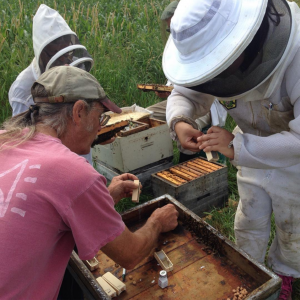Michael Palmer: Queen Rearing and Other Advice for New Beekeepers

Michael Palmer’s beekeeping career started in 1974 when he took a beekeeping course and started off with just a couple hives from Bedford, Quebec, Canada. In 1979/1980, he bought a hundred hives from Better Bee and bought (nucs) from a friend because back then, prices were pretty low. By 1982, he bought another hundred hives and was up to 200. During this period, he was working the fall, winter, and spring in the sugar woods and when he was done with that, he went to work in an orchard in New York state where they had 500 hives, which then put him at over 700 hives. Michael worked for them for four years and then bought their bees.
By 1992/1993 a few years after tracheal and became a huge problem, Michael lost a lot of his bees. In 1998, he went to visit Kirk Webster in Vermont and “that’s where the real change [was] for me,” says Michael, “to be able to raise my own [queens].” Michael says when you’re trying to run a commercial operation, you can’t spend all your money on something you can make, so his visit to Kirk Webster’s operation got him started on raising his own queens. From then on, he saw the quality increase.
Michael’s current setup includes a mating yard in the middle of about five to six of his apiaries where he gets his drones and where he tries to put good stock. Michael does not buy queens. “If I buy a queen or trade with someone, it’s for breeding purposes, not for production queens,” says Michael.
Since becoming a beekeeper, Michael has shared his nuc and queen rearing project information with everyone, largely through YouTube videos. He’s really pleased at how many people are now nucleus colonies. He also feels fortunate in how much he gets to travel. “We go all over the world doing talks on bees and wintering nucs and raising queens,” says Michael. “Two weeks in New Zealand, three weeks in England…it’s pretty amazing [to] meet all the beekeepers and see what they do and their differences.”
Much like Brian and Jasmine, Michael has seen how beekeeping has “pulled [many a person] up out of the hole they were in [giving] them something to focus on.” He says beekeeping is “one of the best forms of meditation that you can have…the movement and the buzzing and everything else in the world disappears.” He continues, “It’s also like communion, both meditation and communion. It’s incredible.”
To new beekeepers, Michael suggests joining a bee club, getting a mentor, and keeping good records. “After that, it’s still a lot of experimenting and [hands on] learning” says Michael, which is why he emphasizes getting a good mentor.
Despite some beekeepers’ belief that feeding bees sugar is not healthy, Michael will tell anyone that “you can’t be afraid to feed sugar if they are starving.” And he also believes that as far as varroa mites go, it’s wonderful if some folks are not using treatments for mite control but that we must not “forget we are in a community here and when your colony crashes from varroa mites, it spreads varroa mites all over the neighborhood.”
Michael’s approach to beekeeping also differs from some of the other folks we’ve heard from in the sense that he says, “You can’t just walk away from your bees. It takes work. It takes investigation, it takes looking at them” on a least a regular basis of once a month or more. Michael is also skeptical of anyone trying to run a commercial operation and going completely treatment free and potentially losing 50-75% of their bees each year.
A major challenge nowadays is that “everyone wants to have bees,” says Michael, and a major concern he has with new beekeepers is when they are unaware of the potentially harmful and unresearched activity they can get into. For instance in buying used equipment, new beekeepers might not know what American Foulbrood disease is, and so they buy “old equipment out of a barn putting it out there, putting bees in it, [and] the colony dies of American Foulbrood.”
He thinks eventually we’ll find a healthy solution for widespread mite reduction. “Over time we are developing traits that are going to help,” says Michael. “So that’s the hope.”
Media Attributions
- Michael Palmer © Michael Palmer is licensed under a All Rights Reserved license
A nucleus colony, or nuc, is essentially a smaller hive, sometimes in a smaller box, consisting of bees in all stages of development, as well as food, a laying queen, and enough workers to cover from three to five combs.
Varroa destructor (Varroa mite) is an external parasitic mite that attack and feeds on the honey bees Apis cerana and Apis mellifera. The disease caused by the mites is called varroosis. The Varroa mite can only reproduce in a honey bee colony.
(of an insect, plant, etc.) live through the winter.


Feedback/Errata
1 Response to Michael Palmer: Queen Rearing and Other Advice for New Beekeepers